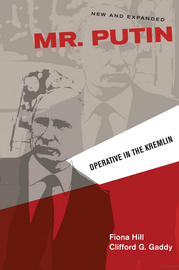A WRITER'S WIT |
My Book World

Expanded. Washington: Brookings, 2015.
When I tuned in to President Trump’s impeachment trial at the end of 2019, I was impressed with the testimony of Fiona Hill, at that time former Deputy Assistant to the President and Senior Director for European and Russian Affairs on Trump’s National Security Council. Her credentials seemed impeccable, and I told myself I would read the book she co-authors with Mr. Gaddy.
The Hill/Gaddy team paint a portrait of Russian President Vladimir Putin that is not personal. They do not delve much into his upbringing or family life, only as those elements may apply to his long political life. They formulate what they refer to as Putin’s six identities, by which the book is structured: “the Statist, the History Man, the Survivalist, the Outsider, the Free Marketeer, and the (KGB) Case Officer (18).” The man manipulates or exploits each one of these identities in order to further his own career, his own strategies, and each study is an eye-opening view into the life of the real Mr. Putin.
Mr. Putin declares himself to be a gosudarstvennik, “a builder of the state, a servant of the state . . . a person who believes that Russia must be and must have a strong state” (40). The State is of ultimate importance, not the individual. Hill/Gaddy claim that “Putin continued with an analysis that echoed the language of the tsarist statist school, noting that Russia will ‘muscle up’ by ‘being open to change’ through state-sanctioned procedures and rules’” (55). The authors reinforce what President Obama once said of Putin, that Putin still maintains a nineteenth-century view of the world. He may utilize some of the tactics he learns while serving in the KGB, but his worldview is rooted in a glorified, pre-Soviet past: he aspires to be a tsar.
To summarize most of the other five areas, Putin manipulates history to strengthen his power. He is a survivalist who will do anything to get what he wants. Ultimately, his sense of strategy (over tactics, which only serve to fulfill his overarching set of goals) is one of his greatest strengths, one that Hill/Gaddy claim the West underestimates at its own peril. A man who creates a long-term strategy for the success of his State and is willing to do anything to see that it succeeds is to be to watched very carefully, something that the authors indicate the West has failed to do thus far. The West must see clearly how the man views himself, and the West, while not forfeiting its own values, must develop strategies for dealing with him, ones that realistically exploit his perceived strengths and weaknesses. Until the man is taken seriously, the rest of the world cannot deal with him in a realistic manner, and such a stance is not good for that world.
NEXT FRIDAY: My Book World | George C. Edwards's Why the Electoral College Is Bad for America.



 RSS Feed
RSS Feed